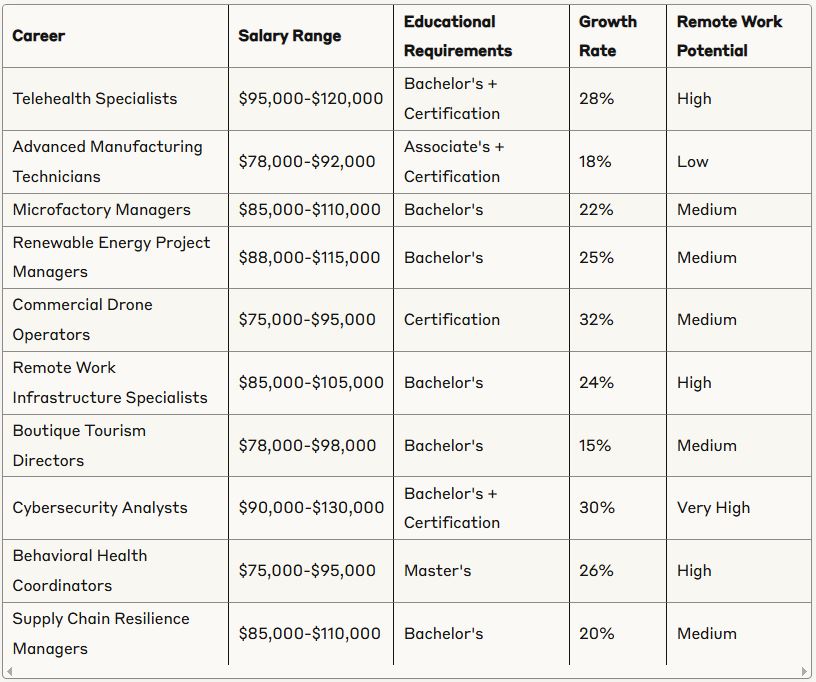Remote Work Revolution Creates New Opportunities Away From Major Cities
The American workplace landscape has undergone a dramatic transformation since 2020. What began as a temporary response to a global crisis has evolved into a permanent shift in how and where we work. For many professionals, this has meant the freedom to leave behind the congestion and high cost of living in major metropolitan areas without sacrificing career advancement or compensation.
Small towns across America are experiencing unprecedented growth as remote workers seek more affordable housing, lower taxes, and improved quality of life. But something even more interesting is happening: these communities aren’t just becoming bedroom communities for remote employees—they’re developing vibrant local economies with high-paying jobs of their own.
Let’s explore the fastest-growing small town career opportunities that offer salaries exceeding $75,000 annually, based on the latest 2025 employment data.
Why Small Towns Are Becoming Career Hotspots
Before diving into specific roles, it’s important to understand the factors driving this shift:
- Technology infrastructure improvements – High-speed internet is now available in previously underserved communities
- Lower overhead costs for businesses compared to major cities
- Quality of life considerations including shorter commutes and access to nature
- Public-private partnerships creating incentives for business relocation
- Remote work normalization changing traditional hiring geography restrictions
As Thomas Wilson, economic development director for Reno, Nevada explains: “What we’re seeing isn’t just remote workers moving here. We’re seeing entire businesses relocate or establish satellite operations because they can offer employees a better lifestyle while maintaining productivity. The talent follows, and then more businesses follow the talent.”
Top 10 High-Paying Small Town Careers in 2025
1. Telehealth Specialists – $95,000-$120,000
Where they’re thriving: Bend, OR; Asheville, NC; Burlington, VT
The telehealth industry continues its explosive growth, with specialists who can manage virtual care networks in high demand. These professionals combine healthcare knowledge with technical expertise to coordinate remote patient care systems.
Dr. Sarah Jenkins, Chief Medical Officer at MountainCare Health Network in Asheville, notes: “We simply can’t hire telehealth coordinators fast enough. Our network serves rural communities across three states, and the specialists who can manage these systems command premium salaries while enjoying the benefits of small-town living.”
Many telehealth operations centers are strategically located in smaller communities with lower real estate costs while serving patients across wide geographic areas.
2. Advanced Manufacturing Technicians – $78,000-$92,000
Where they’re thriving: Chattanooga, TN; Auburn, AL; Oshkosh, WI
Modern manufacturing requires highly skilled technicians who can program, operate, and maintain advanced robotics and automation systems. As manufacturing continues reshoring to America, many operations are choosing smaller communities with available industrial space and lower operating costs.
These roles typically require specialized training but not necessarily four-year degrees, making them accessible through community college programs and apprenticeships.
3. Microfactory Managers – $85,000-$110,000
Where they’re thriving: Greenville, SC; Huntsville, AL; Boise, ID
The microfactory concept—small-scale, highly automated production facilities—has revolutionized manufacturing. These operations can be profitable with just 15-30 employees and are perfectly suited for smaller communities with lower overhead costs.
Managers who understand agile manufacturing principles, supply chain management, and digital production technologies are commanding impressive compensation packages, often including equity.
4. Renewable Energy Project Managers – $88,000-$115,000
Where they’re thriving: Montrose, CO; Traverse City, MI; Flagstaff, AZ
With significant federal and state investments in renewable energy infrastructure, project managers who can oversee solar, wind, and other clean energy installations are in extremely high demand. Many of these projects are necessarily located outside major urban centers, creating career opportunities in smaller communities.
“We relocated from Denver three years ago to manage solar installations in western Colorado,” explains Miguel Rodriguez, a renewable energy project manager. “My salary actually increased, my housing costs were cut in half, and I have a 10-minute commute through beautiful scenery instead of an hour in traffic.”
5. Commercial Drone Operators & Analysts – $75,000-$95,000
Where they’re thriving: Pocatello, ID; Logan, UT; Kalispell, MT
The commercial drone industry has matured significantly, moving beyond novelty to essential business operations in agriculture, infrastructure inspection, real estate, and environmental monitoring. Certified drone operators with specialized analysis skills can command impressive salaries while working in scenic smaller communities.
These roles typically require FAA certification and specialized training in data analysis software, but formal education requirements vary widely.
6. Remote Work Infrastructure Specialists – $85,000-$105,000
Where they’re thriving: Bentonville, AR; Lewisburg, WV; Portsmouth, NH
As communities compete to attract remote workers and digital businesses, specialists who can develop and implement remote work infrastructure are in high demand. These professionals design co-working spaces, manage municipal broadband projects, and create digital nomad attraction programs.
Many small towns have created dedicated economic development positions focused solely on remote work infrastructure, recognizing the outsized economic impact these initiatives provide.
7. Boutique Tourism Directors – $78,000-$98,000
Where they’re thriving: Taos, NM; Door County, WI; Staunton, VA
Small town tourism has evolved far beyond traditional approaches, with communities developing sophisticated strategies to attract high-value visitors seeking authentic experiences. Directors who can develop and market unique tourism experiences built around local culture, food, outdoor recreation, and arts can command salaries previously only seen in major destinations.
“Visitors aren’t just looking for a place to vacation anymore—they’re scouting potential places to relocate,” says Jennifer Morgan, tourism director for a historic Virginia community. “Every visitor is a potential resident or investor, which has completely changed how communities value tourism development.”
8. Cybersecurity Analysts – $90,000-$130,000
Where they’re thriving: Conway, AR; Cedar Falls, IA; Auburn, ME
While cybersecurity has traditionally concentrated in tech hubs and government centers, the distributed nature of modern security operations has created opportunities virtually anywhere with reliable internet connectivity. As small and mid-sized businesses face the same security threats as larger enterprises, regional cybersecurity firms have developed to serve local markets.
Many communities with state universities or community colleges have developed cybersecurity specializations, creating talent pipelines that support local employers.
9. Behavioral Health Coordinators – $75,000-$95,000
Where they’re thriving: Athens, OH; Durango, CO; Grand Junction, CO
The ongoing mental health crisis has created significant demand for behavioral health professionals across the country. Small communities, historically underserved in this area, are now developing innovative programs that combine in-person and virtual care.
Coordinators who can manage these hybrid systems are commanding strong compensation packages, often with signing bonuses and relocation assistance.
10. Supply Chain Resilience Managers – $85,000-$110,000
Where they’re thriving: Opelika, AL; Stillwater, OK; St. Cloud, MN
After years of supply chain disruptions, companies are investing heavily in building resilient, regionalized supply networks. This has created opportunities for logistics specialists in smaller communities that serve as regional distribution hubs.
These professionals identify vulnerabilities in supply networks and develop contingency plans to ensure business continuity, a function that has become essential as climate disruptions and geopolitical tensions continue to threaten global commerce.
Comparison of Top Small Town Careers in 2025

Emerging Small Town Hubs: Where The Jobs Are
Several small towns have positioned themselves particularly well to attract these high-paying careers:
Boise, Idaho
Once primarily known for its outdoor lifestyle, Boise has developed into a technology hub with particular strengths in cybersecurity and drone operations. The combination of relatively affordable housing (compared to coastal tech centers), outdoor recreation access, and a growing tech ecosystem has created a vibrant job market.
Chattanooga, Tennessee
After investing heavily in municipal broadband infrastructure over a decade ago, Chattanooga has leveraged its “Gig City” status to attract advanced manufacturing and technology companies seeking lower operating costs than those found in Nashville or Atlanta.
Reno, Nevada
Benefiting from proximity to California without California’s tax structure or cost of living, Reno has successfully diversified beyond gaming to become a hub for microfactories and distribution operations serving the west coast.
Burlington, Vermont
Combining a picturesque setting with a strong university presence and progressive policies, Burlington has developed particular strength in telehealth operations and behavioral health coordination.
Bentonville, Arkansas
Once known primarily as Walmart’s headquarters, Bentonville has transformed into a center for supply chain innovation and remote work infrastructure, leveraging its logistics expertise while adding cultural amenities that attract knowledge workers.
How to Position Yourself for These Opportunities
If you’re interested in pursuing these high-paying small town careers, consider these strategies:
- Develop specialized technical skills that complement your existing expertise
- Research communities with growing sectors matching your career interests
- Build remote work experience even if you eventually plan to work on-site
- Network virtually with professionals in your target locations and industries
- Consider certificate programs that can quickly develop in-demand skills
Many of these positions offer relocation assistance and signing bonuses to attract talent from major metropolitan areas, making the transition financially feasible even when significant moves are required.
Conclusion: The Changing Geography of Opportunity
The narrative that high-paying careers are only available in major cities has been thoroughly debunked by recent trends. Technology, changing work norms, and quality of life considerations have combined to create vibrant career opportunities in communities previously overlooked by knowledge workers.
As Jason Reynolds, an economic geographer at the University of Colorado, explains: “We’re witnessing the most significant redistribution of economic opportunity in the United States since the Industrial Revolution brought workers from farms to factories. The difference is that this time, the movement is bidirectional—opportunity is flowing out from cities as well as into them.”
For professionals willing to consider locations beyond traditional career hubs, these small town opportunities offer not just competitive compensation but potentially transformative lifestyle benefits.
Frequently Asked Questions
How reliable is high-speed internet in these smaller communities?
Many of the communities emerging as small town career hubs have invested heavily in broadband infrastructure, often offering faster and more reliable internet than available in some urban areas. However, it’s essential to research specific communities, as availability can vary significantly. Resources like BroadbandNow provide detailed coverage information for prospective residents.
Are there opportunities for career advancement in smaller markets?
While conventional wisdom suggested career advancement required presence in major markets, remote work has changed this dynamic substantially. Many professionals now report faster advancement by standing out in smaller markets while maintaining virtual connections to larger networks. The key is choosing communities with multiple employers in your field rather than becoming dependent on a single company.
What about cultural amenities and diversity in small towns?
Small towns attracting knowledge workers have generally invested significantly in cultural amenities, recognizing their importance in talent attraction. While diversity varies considerably between communities, many of the fastest-growing small towns for professional careers show increasing diversity metrics as they attract residents from varied backgrounds. Researching specific communities through resources like City-Data can provide detailed demographic information.
How do public schools compare to those in major metropolitan areas?
Educational quality varies significantly between communities, though many small towns with growing knowledge worker populations have strong public school systems. In some cases, lower student-teacher ratios and community involvement create educational advantages compared to urban districts. Resources like GreatSchools allow prospective residents to research specific districts.
Are these small town salary figures adjusted for cost of living?
The salary ranges listed represent actual compensation rather than cost-of-living adjusted figures, making them even more impressive considering the typically lower expenses in smaller communities. Housing costs in particular tend to be substantially lower than in major metropolitan areas, though this advantage varies by region.
This article was last updated on April 15, 2025. Employment data sourced from Bureau of Labor Statistics, LinkedIn Economic Graph, and proprietary research
Was this article helpful?
[👍] Yes, this information was useful
[👎] Somewhat helpful, but I need more specific information
[❌] No, I need different information
You might like: The Top 10 Remote Jobs in 2025
